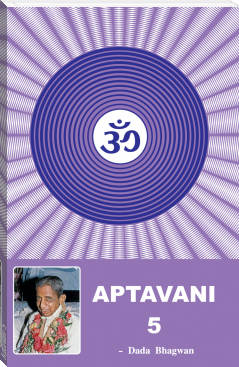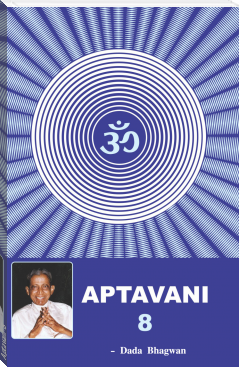Aptavani-9 by Dada Bhagwan (i can read with my eyes shut txt) 📕

Read free book «Aptavani-9 by Dada Bhagwan (i can read with my eyes shut txt) 📕» - read online or download for free at americanlibrarybooks.com
- Author: Dada Bhagwan
Read book online «Aptavani-9 by Dada Bhagwan (i can read with my eyes shut txt) 📕». Author - Dada Bhagwan
Up until now whatever knowledge one moved around with, whatever tools of knowledge he utilized, starting from the time he became suspicious about that knowledge and the tools, to the point of becoming completely suspicion-less (nihshankta) regarding the Soul, (the Self), that entire duration of period in spirituality is regarded as having suspicion with reference to the Soul. Once that suspicion-less-ness (nihshankta) occurs, one becomes free of fears (nirbhayta)! And where there is fearlessness, there is a state of nonattachment (asangata) in the presence of all attachments!
Akram Vignan is to be applauded in wonder that within one hour of the miraculous Gnan Vidhi (the one hour spiritual process of Self-realization), one becomes permanently suspicion-free about the Soul.
Suspicion about the Soul cannot go away by reading books. A manifest Gnani is required there. As one knows more and more information from the scriptures, his suspicion increases more and more; once he reaches a stage of ‘I don’t know anything’, he is ready for real knowledge. The knowledge that gets rid of kashayas i.e. anger, greed, pride, deceit, is real knowledge; it is Gnan. Where there is suspicion, there is agony. The sign of knowing the Soul is a permanent suspicion free state.
To have suspicion is to have an awareness of a kind, ‘Did I do this or did someone else do it?’ To have such a suspicion is called higher awareness. ‘I became engrossed (with the relative-self)’, this suspicion that occurs after Self-realization is also a form of awareness of knowledge. In the final stage there prevails, at all times, an awareness of: ‘I never become tanmayakar (engrossed) at all.’
In Gnani Purush’s state, all the worldly interactions are done by the pudgal, the relative self and He remains vitarag (detached). In spite of interacting with the world at every moment, for Him there is no intense mental note (nondha) of anything. One’s vision becomes muddy when an intense mental note (nondha) is made. Always seen in the eyes of the Gnani Purush is vitaragata, a state of freedom from all attachments.
Where there is true love, there is no intense mental note (nondha). Where there is no intense mental note, there is a tension free state!
The worldly love is the love that keeps intense mental notes, it is known as attraction-fondness (aasakti). Love that vacillates; love that goes up and down is called infatuation only.
The moment one says ‘This is what you said to me that day!’ is regarded as keeping an intense mental note and as a result, one’s love will vanish. By keeping such a note about the wife who is considered to be your own, will result in turning a loving life in to a poisonous one.
First comes into one’s conviction (pratiti) the opinion of ‘it is wrong to keep an intense mental note’ then it will come into his experience ( anubhav) and then ultimately it will express in his conduct (charitra). This is the scientific process through which things express in one’s conduct.
There will be revenge (vair) in the mind if an intense mental note (nondha) is kept. Half the pain vanishes by not keeping such a note. Gnani Purush never keeps a note. When you keep a note, the opposing party will also keep one too.
First begins the taking of a note (nondha), then starts the mind’s battle, then the battle of words and finally it can end up in a physical battle. Therefore, it is best to pluck out the root!
The person wanting liberation must get rid of the ‘notebook’. For those who stop taking notes (nondha), their worldly interactions come to an end.
Those who are certain in the worldly interactions remain uncertain about liberation. Certainty in the world means supporting the worldly interactions.
In order to dissolve the innate nature (prakruti) of taking notes, what does Akram Vignan say? It says that note takingis done by the innate nature (prakruti) and the real Self has to simply know that. It is not objectionable that a note is made, but if the Self’s agreement with taking notes goes away; the note too will go away.
The habit of ‘taking note nondha’ will not be given up without the help of the Science (Vignan). The innate worldly nature will choose to die rather than give up taking intense mental notes.
How can a note be made of the karmas that are changing; karmas that are constantly rising and setting?
What is the process of making a note? For whatever reason, if one has the slightest like or dislike via a nimit (an apparent doer who is simply instrumental in the process), an intense mental note is made about it. But if no note is made about the nimit, such inner spiritual effort ( purusharth) will lead one to liberation.
There is always engrossment with the relative self when a note (nondha)is made. Thereafter it will go under the authority of the relative self. The Self’s realm and energy will be blocked.
When note is taken, the mind becomes poisonous towards that person. The one who has stopped taking notes is considered to have turned to the state of becoming a vitarag.
3. Commonsense : Welding
These days commonsense has been sidelined, proclaims the Gnani Purush.
“Commonsense means it is everywhere applicable, theoretical as well as practical.” This definition of commonsense is quite original and wonderful.
The one with commonsense will open all the locks, no matter how rusty they are. He does not clash with anyone; he avoids clashes by using his commonsense at home, outside, in the workplace and everywhere else. He does not allow separation due to difference of opinions, with his wife at home.
No matter how intelligent a person may be but if there is no practicality in him i.e. if there is no commonsense, there will be clashes.
As one’s ego goes down, his ‘dealing’ will become proportionately beautiful with everyone.
Commonsense develops by talking about various things with everyone in an affable way. Commonsense is lessened by scorn for the worldly life. The one with commonsense is in tune with everyone.
In the worldly life, commonsense is useful to make decisions and to avoid clashes. A simple man will get cheated but in return his commonsense will develop.
Commonsense can be effective to the point where one can allow no ‘depression’ to occur, no matter how many insults he is subjected to.
Commonsense does not develop when there is selfishness or plotting because it is used up in the plotting or in deceitful intents.
If one becomes an expert in any one aspect, his commonsense becomes obstructed.
The one with commonsense has studied the innate nature (prakruti)of the other person and that is why he can open any type of locks.
Commonsense is a type of an insight and insight is a natural gift. Intellect (buddhi) shows worldly profit and loss. The direct light of the Soul ( pragnya) is born only after achieving the light of knowledge, Gnan. Commonsense can open up all the locks in the world but it can’t open a single lock for one’s salvation (moksha) whereas pragnya will take one to moksha.
To adjust everywhere, one can observe how the Gnani Purush conducts himself by adjusting everywhere in everyway. And the one who has learned how to adjust everywhere has surmounted the world.
It is better to ‘adjust’ rather than complain. If your light is brighter, dim your light in order to adjust with the person with the dim light.
The Gnani Purush gives us the key to avoid separation due to difference of opinion (matbhed) and this key is, ‘We are all one and there is no difference in us.’ One should repeat this sentence five times every morning, then one day; a time will come when you will not have any matbhed with anyone.
How can anyone create a wedge in our unity? Those who do are plotters with deceitful gossip. How can they be allowed to interfere? How can one afford to be immature and allow himself to be instigated by others?
One should always do the ‘welding’ (patching up) whenever a wedge is created with anyone. It is considered a great quality of virtue to do the ‘welding’ for others, even if there is suffering and difficulty on the part of the one doing the welding.
In these times, the one who does the welding i.e. unifies others, will suffer. After the welding, the two estranged parties will unite and the welder will be at a loss! After this kind of suffering the welder backs off. However, the one who wants to improve for the Self should weld in spite of the suffering!
If one is not comfortable in doing the welding, he should maintain the intention in his mind of, ‘I want to do the welding’ but he should not have the negative intention of, ‘It is better if they are separated.’
Those who break up relationships are found everywhere but those who unite people are rarely to be found.
4. My-ness (mamata): intense insatiable greed (lalacha)
While life is short, how can a single minute be wasted? You should pass through this world without any ‘dirt’ touching you. Where there are no expectations of any kind at all, no blemish of any kind at all, where there is complete purity, there is the status of the Gnani! The Gnani Purush does not have any attachment even for his body. The Gnani Purush is without ego or ‘my-ness’.
Mamata (my-ness) means ‘mine’ and as a result of this my-ness, ‘I’ has continued to exist. The span of my-ness can expand from ‘my body’ to ‘my wife, my house, my town, my country, my world.’ Etc.
My-ness should be there with a boundary. The boundary of my-ness means, it will exist as long as one is alive, for example the ‘my-ness’ with the body. Any further extension of my-ness should not be there, including the ‘my-ness’ for an only son. Otherwise, that extended my-ness will only be painful.
If an insured ship sinks, how much worrying does the insurance agent have? If one’s my-ness is of this kind, it will not cause any pain.
If a bungalow burns down after it is sold and all the documents are signed, would one feel anything? No; if ‘my-ness’ can vanish simply by signing papers of agreement, can it not go away by correct understanding? Otherwise, the bungalow will say, ‘Boss, either I will go or you will go.’
What are the rules in a museum? You are allowed to see everything and tour around but you can’t take anything with you. In the same token, people have to leave everything behind and go with respect, lying down in a funeral bier! In such a world, why have all these headaches?
What is indicated by the ‘my-ness’ that causes clashes? Why is there pain when the wife who is really not your own, dies? At the time of the marriage ceremony this my-ness becomes completely binding as the husband begins to think ‘this is my wife…my wife…my wife...’ Because of this, there is a psychological effect and the ‘my-ness’ about the wife enters within. This is what causes pain and freedom from this pain occurs when the complex knots of ‘my-ness’ are





Comments (0)